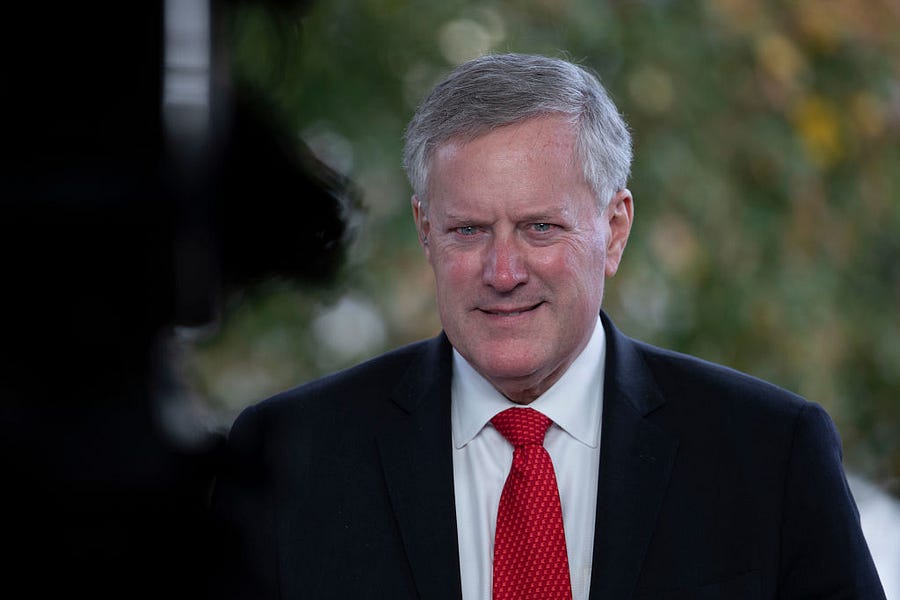The House vote Tuesday to find Mark Meadows in contempt of Congress means that the former chief of staff to Donald Trump could face prosecution for failing to comply with a subpoena issued by the body in which he once served. His on-again, off-again cooperation with the select committee investigating the events of January 6 also raises questions about “executive privilege,” to whom it applies, and when it can be invoked.
The House’s vote follows the January 6 Select Committee’s recommendation. The committee is keenly interested in what Meadows, who served in the House from 2013 to 2020, when he resigned to serve in the Trump White House, knows about the period from Election Day 2020 up to the day of the deadly riots at the Capitol.Meadows partially cooperated with the investigation and even turned over thousands of pages of records from his time in the White House–including the texts from lawmakers and Fox News personalities that have dominated the news cycle this week–before he abruptly stopped doing so. He’s justified this obstruction largely on claims of “executive privilege.”
Public and political reactions to disputes of this kind tend to fall along expected partisan lines, as the House vote on Meadows reflected. How one feels about the former president and the events of last year likely inform how one feels about Congress’ right to pursue this information and Meadows’ noncompliance. But these structural disputes involving the powers of two branches of government, and disputes between current and former officeholders, have larger and longer-term stakes than today’s partisan contests. It’s worth pausing to consider both congressional investigations and executive privilege in the abstract, how they function, and how they conflict.
The Constitution does not contain explicit provisions establishing congressional powers of oversight and investigations, but these powers are necessary implications of powers expressly granted, such as the powers to legislate, appropriate, and impeach. Without the ability to gather and analyze information, Congress could scarcely carry out these functions. Courts have long accepted this and further recognized that, in order to carry out its investigatory functions, Congress must have the means to compel both testimony and the production of evidence.
The very first Congress began the practice of investigations and issuing subpoenas, and a variety of enforcement mechanisms followed soon after. Congress’ investigatory powers have led to historical set pieces examining government scandals such as Teapot Dome and Watergate, as well as investigations of social problems and disasters ranging from the sinking of the Titanic to American organized crime. Prominent officials, titans of industry, and others have appeared before Congress to answer questions, under oath and under penalty of perjury. (Lying to Congress is actually a crime, whether under oath or not.)
But congressional investigatory and oversight work is not limited to headline-grabbing affairs, and today every standing committee of Congress has subpoena power. Hearings and other investigatory work are routine functions of all committees, and some panels, such as the Senate Permanent Subcommittee on Investigations, focus heavily or exclusively on this type of work. Individual members, too, conduct important oversight through less formal letters and requests for information.
It is through its investigation powers that Congress identifies areas in need of legislation or reform, exposes the waste or abuse of taxpayer funds, and addresses malfeasance and maladministration. This work remains an important feature of our system of government. Without these powers, Congress—the branch of government closest and most accountable to the people—could not keep a leash on the ever more expansive federal government and sprawling bureaucracy.
Like congressional investigatory powers, the Constitution makes no mention of executive privilege. The idea that the president can resist demands for information from Congress or the courts trace back to the beginning of the republic, but rest on murkier constitutional foundations. In essence, the privilege follows from the idea that separation of powers necessitates a vitality in the executive branch that, in turn, requires a degree of confidentiality and independence. Presidents must be able to ask advisers to speak honestly and forthrightly without concern that their comments will be made public.
While the courts have recognized such a privilege, it is limited and qualified. Generally, there’s only a privilege with respect to official presidential duties. It does not protect political activities or conversations with parties outside the executive branch, much less criminal wrongdoing. And even when properly invoked, the privilege can be overcome by a legitimate investigatory need.
In practice, most conflicts between Congress’ interest in obtaining information and a president’s interest in preserving a zone of confidentiality have been resolved through negotiations and accommodations between the political branches. But that tradition of constitutional give-and-take has been tested in recent years, especially during the last administration.
Congress has a number of ways to deal with noncompliant witnesses, one of which is to refer a matter to the Justice Department to pursue criminal contempt charges. The criminal contempt statute, first adopted in 1857, makes it a federal crime to “willfully” fail to cooperate with a congressional subpoena. The offense is punishable by a fine and up to one year in prison.
This brings us back to Meadows. He spoke with Sean Hannity this week and argued that he cannot be construed to have “willfully” failed to cooperate with the January 6 congressional investigation. “I’ve tried to share nonprivileged information, but truly the executive privilege that Donald Trump has claimed is his to waive, it’s not mine to waive, it’s not Congress’s to waive.”
But even if executive privilege were absolute (which it isn’t) and even if it potentially covered all the information sought (which it doesn’t), the privilege does not so clearly belong to Donald Trump. Executive privilege exists to serve the long-term interests of the executive branch and, through it, the health of the separation of powers and the Constitution. While former presidents can assert claims of executive privilege, the courts will and have primarily looked to the current executive branch itself to determine those interests. The executive branch is headed by Joe Biden.
Meadows’ position is further and perhaps fatally complicated by the fact that he apparently has completely ceased cooperating with Congress, refusing to appear to assert limited privileges, or even answer questions about documents he has already turned over without asserting privilege. As Liz Cheney, the vice chair of the select committee, testified before the House Rules Committee: “This contempt proceeding relates principally to Mr. Meadows’ refusal to testify about the text messages and other communications he admits are not privileged. He has not claimed, and doesn’t have any privilege basis, to refuse to answer our questions about these texts and about these topics.” Chairman Bennie Thompson similarly argued: “discussion about different privileges is a distraction. That’s not what this contempt referral is primarily about. This referral centers on the information that even Mr. Meadows and his attorney say is outside all those claims of privilege.”
In a leading Supreme Court case on executive privilege, United States v. Nixon, the court concluded that executive privilege claims cannot be so absolute as to “gravely impair the role of the Courts under Article III.” Nor should such privilege claims be read so broadly as to “gravely impair” the ability of Congress to perform its investigatory role under Article I. It would be especially ironic, to the point of absurdity, if a doctrine meant to ensure the separation of powers could be deployed to frustrate Congress’ ability to investigate a violent assault and its ability to perform its constitutional functions.






Please note that we at The Dispatch hold ourselves, our work, and our commenters to a higher standard than other places on the internet. We welcome comments that foster genuine debate or discussion—including comments critical of us or our work—but responses that include ad hominem attacks on fellow Dispatch members or are intended to stoke fear and anger may be moderated.
With your membership, you only have the ability to comment on The Morning Dispatch articles. Consider upgrading to join the conversation everywhere.